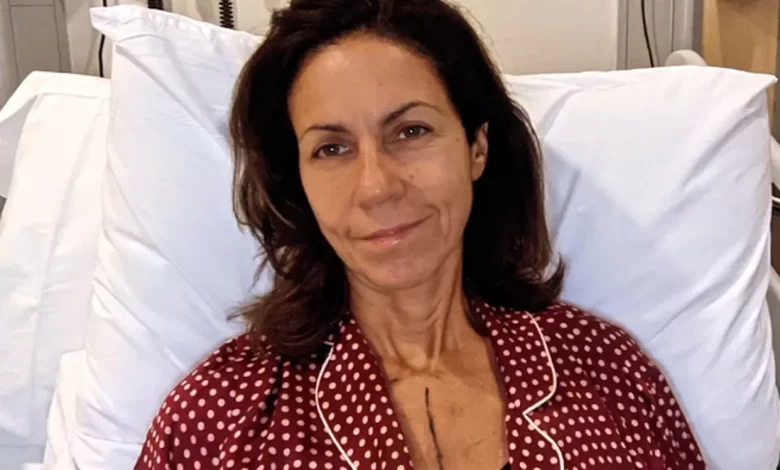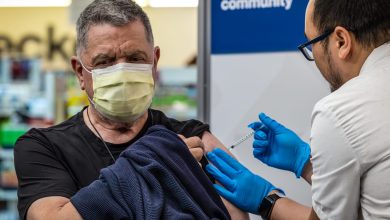Julia Bradbury Reveals: How Her Cancer Diagnosis Changed Her Drinking Habits Forever

Introduction
The word cancer often evokes fear, uncertainty, and deep concern. For many, hearing the phrase “you have cancer” becomes one of the most life-altering moments of their lives. But what exactly does a cancer diagnosis mean? How is it determined, and why is early detection so critical? Beyond the medical process, a diagnosis also carries profound emotional, social, and practical implications for patients and their families.
Cancer diagnosis in detail—covering its medical foundations, methods of detection, the role of screening, challenges in diagnosis, emotional impact, and the evolving future of cancer diagnostics.
What Is a Cancer Diagnosis?
A cancer diagnosis is the process of identifying cancer in the body, confirming its type, determining its stage, and establishing how far it has spread. Cancer occurs when abnormal cells grow uncontrollably, evade normal regulatory mechanisms, and invade surrounding tissues or spread to distant organs.
A diagnosis is not just about confirming the presence of cancer—it also involves:
- Identifying the type of cancer (e.g., breast, lung, colon, prostate, skin, etc.).
- Determining the stage of cancer, which describes its size, spread, and severity.
- Establishing the grade of cancer, which indicates how aggressive the tumor cells appear under the microscope.
- Understanding the molecular or genetic profile, which may guide personalized treatment options.
Types of Cancer Diagnosis
Different diagnostic approaches are applied depending on the cancer type:
- Breast Cancer – Mammography, MRI, biopsy, hormone receptor testing.
- Lung Cancer – Chest X-ray, CT scan, bronchoscopy, biopsy.
- Colorectal Cancer – Colonoscopy, biopsy, stool DNA tests.
- Prostate Cancer – PSA blood test, MRI, biopsy.
- Skin Cancer – Visual exam, dermoscopy, skin biopsy.
- Blood Cancers (Leukemia, Lymphoma, Myeloma) – Blood tests, bone marrow biopsy, genetic testing.
When beloved television presenter and outdoor enthusiast Julia Bradbury announced her breast cancer diagnosis,causes,symptoms in 2021, the news shook many of her fans. Known for her adventurous spirit and passion for the great outdoors, Bradbury’s health battle quickly became a moment of reflection—not just for her, but for people everywhere. Since then, she has spoken openly about her experience, hoping her journey might inspire others to think differently about lifestyle, health, and prevention.
In a recent interview, Julia Bradbury reveals how one of the most profound shifts in her life following cancer was her relationship with alcohol. Once a regular part of her social and professional life, drinking is now something she views through a completely different lens.
The medical science behind alcohol and cancer risk, and the wider lessons we can all learn from Bradbury’s brave and candid revelations.
Julia Bradbury Before the Diagnosis
Before cancer entered her life, Julia Bradbury lived what many would consider an active and balanced lifestyle. She built her career presenting television programmes such as Countryfile and Britain’s Best Walks, showcasing her love for nature and travel. Exercise and outdoor exploration were integral to her identity.
Like many people, however, alcohol was a familiar presence. Bradbury has admitted she enjoyed drinking socially, whether at dinner parties, work events, or casual evenings with friends. It wasn’t excessive in her eyes—just part of normal adult life.
But in hindsight, she acknowledges that her drinking habits, like those of millions of others, were rarely questioned. Wine with dinner, champagne at celebrations, cocktails on holiday—these moments were routine. Cancer diagnosis delayed until the second year of the pendamic. however, forced her to reevaluate everything.
The Diagnosis That Changed Everything
In 2021, Julia Bradbury was diagnosed with breast cancer. The news was devastating, but it also propelled her into a new chapter of self-discovery and lifestyle transformation. Following surgery and ongoing treatment, she began to reflect on the role that everyday choices—including diet, stress, exercise, and alcohol—played in her overall health.
In her own words, Julia Bradbury reveals that she began to ask herself tough questions:
- Alcohol can affect you in the bedroom?
- Could cutting back lower her risk of recurrence?
- Did drinking genuinely add joy to her life—or was it simply a habit?
The answers she uncovered changed her approach forever.
Julia Bradbury Reveals: A New Perspective on Drinking
Since her diagnosis, Julia has become vocal about her shift in perspective. She now speaks openly about how alcohol is no longer a casual indulgence, but something she approaches with caution and restraint.
“Once you’ve had cancer, everything changes,” Julia Bradbury reveals in interviews. “You start to question every choice you make. For me, that meant looking closely at alcohol and realizing I didn’t want to put my body through any additional strain.”
For Bradbury, this isn’t about judgment or guilt—it’s about empowerment. By reducing her alcohol intake significantly, she feels more in control of her health and better equipped to support her body’s healing journey.
The Science: Alcohol and Cancer Risk
Bradbury’s reflections are not unfounded. Medical research has long highlighted the link between alcohol and cancer.
How Alcohol Increases Risk
When consumed, alcohol breaks down into acetaldehyde, a toxic chemical that can damage DNA and interfere with the body’s ability to repair itself. Over time, this increases the risk of mutations that can lead to cancer.
Studies have linked alcohol to several cancers, including:
- Breast cancer
- Liver cancer
- Mouth and throat cancer causes,symptoms
- Colorectal cancer
For women, even moderate alcohol intake can increase the risk of breast cancer, partly due to its effect on estrogen levels.
Public Health Guidance
Organizations like the World Health Organization (WHO) and the American Cancer Society now emphasize that there is no completely safe level of alcohol consumption when it comes to cancer risk. While small amounts may carry lower risk, the safest option is to limit or avoid alcohol altogether.
This growing body of evidence validates the lifestyle changes that Julia Bradbury reveals she has made.
Julia Bradbury’s Lifestyle Shift
So what does her new relationship with alcohol look like?
- Drastically Reduced Intake – Julia admits she now drinks rarely, if at all. Special occasions may warrant a small glass, but day-to-day drinking is no longer part of her routine.
- Mindful Choices – When she does choose to drink, she is mindful about portion size and frequency. The decision is conscious, not automatic.
- Alternative Enjoyment – Instead of associating relaxation or celebration with alcohol, she now leans into other habits: herbal teas, alcohol-free wines, or sparkling water with fresh fruit.
- Health Prioritization – Every choice is filtered through the lens of supporting her recovery, minimizing recurrence risk, and living with vitality.
This change doesn’t just affect her body; it has reshaped her outlook on life, making her more present, energetic, and grateful.
Mental and Emotional Impact
Julia Bradbury reveals that removing alcohol from her regular routine has had profound mental and emotional effects:
- Improved Clarity: Without the brain fog of drinking, she feels sharper and more focused.
- Better Sleep: Alcohol often disrupts sleep cycles; abstaining has allowed for deeper rest.
- Reduced Anxiety: Post-cancer anxiety is real, and she finds that alcohol no longer worsens it.
- Enhanced Resilience: She feels more emotionally grounded, better able to handle the ups and downs of recovery.
Lessons for Everyone
While Julia Bradbury’s story is personal, the lessons resonate widely. Cancer is not always preventable, but lifestyle changes can reduce risk and improve quality of life.
Here are some takeaways inspired by her journey:
- Question Habits – Just because alcohol is normalized in society doesn’t mean it’s harmless. Reflect on why and how you drink.
- Prioritize Health – Small changes add up. Cutting down on alcohol can reduce cancer risk, support immunity, and boost energy.
- Find Alternatives – Non-alcoholic beverages are increasingly popular and enjoyable. Experiment with mocktails, kombucha, or herbal infusions.
- Listen to Your Body – If something doesn’t serve your health, it may be time to let it go.
- Seek Support – Whether from friends, family, or online communities, support makes lifestyle changes more sustainable.
Julia Bradbury’s Advocacy
Since her diagnosis, Julia has embraced advocacy, using her platform to raise awareness not only about breast cancer but also about lifestyle factors that influence health.
Julia Bradbury reveals that she hopes her honesty will encourage others to take preventive steps. “If sharing my story makes even one person stop and think about their drinking habits, then it’s worth it,” she says.
Her voice adds to a growing movement of public figures being transparent about health struggles, reducing stigma, and inspiring change.
A Wider Cultural Shift
Julia’s story fits into a broader cultural trend: the reevaluation of alcohol in modern society. In recent years, “sober curious” movements and alcohol-free challenges like Dry January have gained momentum. Younger generations, in particular, are drinking less than their parents.
This reflects an increased awareness of the link between alcohol, mental health, and physical wellbeing. Julia Bradbury’s openness reinforces the message that reducing alcohol isn’t about deprivation—it’s about empowerment and self-care.
Living Proof: Julia’s Renewed Energy
Today, Julia continues to present, explore, and inspire audiences with her love for nature. She has embraced a plant-rich diet, practices mindfulness, and prioritizes rest alongside her reduced alcohol consumption.
Julia Bradbury reveals that these changes have not only supported her recovery but have given her a renewed zest for life. She continues to hike, travel, and film television projects, all while advocating for better awareness about breast cancer and prevention.
Her story is a testament to resilience: that even in the face of illness, it’s possible to reclaim agency and thrive.
Conclusion:
Julia Bradbury’s cancer journey has been one of hardship, reflection, and transformation. Among the many lifestyle changes she embraced, her redefined relationship with alcohol stands out as both deeply personal and universally relevant.
By sharing her experience, Julia Bradbury reveals that even the smallest choices—like whether or not to have a glass of wine—can carry profound implications for health and wellbeing. Her courage in speaking openly about her struggles and changes not only humanizes her but also empowers others to consider their own habits.
Cancer may have been the catalyst, but her story is ultimately about life: choosing it, protecting it, and living it with clarity and purpose.



